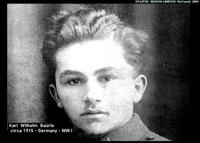1) Everything is a "determinant", or has some degree of "causative" power (though not in the sense of a "first" cause), with the exception of a conscious being, because a conscious being isn't actually a "thing" so much as it is a sum of lots of other things, things like genetic make-up, environment, experiences, memories, desires, etcetera.
2) When we make a "choice", the feeling we have of possessing some sort of executive control over our actions is an illusion. What we sense as a decision-making process, one in which two or more courses of action seem available to us with equal potential of being actualized, is an illusion. It isn't that whatever action we do take has necessarily been "predetermined", but rather that every prior state of affairs determines the state of affairs that follow from them, and by "state of affairs" I mean every internal or external factor at work on a conscious mind or entity at every second, all the time. Therefore, to say that a person "self-determines" any action is to claim that said "person" is somehow "out of the loop", or is in some sense impervious to the constantly forward-moving, snow-balling momentum of time and events. Poetically speaking, to suggest that a person can be "self-determining" at any point in time would be tantamount to saying that such a person can side-step a tidal wave.
***
Determinists seem fixated on illustrating that there is no point at any time prior to making a decision wherein I am completely uninfluenced by any of the factors which contribute to how I decide, and that a "free" choice must be completely divested of anything resembling a reason for choosing what I choose; but in such an instance nothing resembling a decision would or could be made, "freely" or otherwise (which neither party involved in this argument is arguing for), since making a choice presupposes a set of options with forseeable consequences, negative or positive, better or worse. We can only be said to decide something if we are conscious of two or more courses of action and if there occurs a mental process of weighing alternatives . Obviously we can't weigh alternatives or make any considerations without being cognizant of what we want or intend, and being cognizant of what we want or intend presupposes that our decision must somehow be in accordance with that, and therefore influenced by that.
What I believe the free willers are saying is that, certainly, my decisions are influenced by any number of factors, but as far as which influences prove to be stronger-- at any point in time and in any circumstance whatsoever-- there is never a point, at any time prior to the choice being made,-- and I mean the precise, exact moment,-- at which the "state of affairs" is static enough for whatever choice we arrive at to have been in any true sense "determined". A choice is never truly determined until it's been made, because there's an incomprehensibly complex and enormous array of variables constantly at play across every instant in time. In my opinion it's far too disrespectful of all of these variables to sit back, after the fact, and declare that any choice whatsoever, however trivial, was the only choice that was truly available at any or all points prior to choosing.
This isn't to say that there is anything "random" among all these variables. Whatever happens, happens as a result of a prior state, or states, of affairs, -- for lack of a better term (more on that later). This seems like common sense to me and yet it's this self-evident and obvious fact which is sometimes palmed off as sufficient grounds for siding with determinism. Free willers aren't saying that any of their actions are uncaused, only that their actions, though caused, have causative power themselves. That isn't to say that because their actions have causative power they can be thought of as "first causes", or that they somehow enter the flow of events by some magical intervention having no connection or relation to prior events. What they are arguing is that there is no predetermination. Nothing is fixed absolutely, except the laws of nature themselves. Anything can happen, as long as we understand that "anything" means within the confines of physical laws, laws which don't "determine" what happens so much as establish and underlie the limited context in which things happen.
Every conscious entity that is capable of self-generated (and thinking of "self-generated" in strictly mechanical terms is fine with me for the time being) motion is therefore capable, to widely varying degrees, of molding the course of events in a manner which might not have occured were it not for its involvement. This involvement might be so trivial as to be to all intents and purposes negligible, or it might be vastly significant and impact events worldwide, as in the case of a world leader like Hitler. That isn't to say that someone like Hitler came out of a vacuum and acted without desire, reason, influence or motivation. It just means that the course his life took contributed vastly (not to mention horrendously) to the course of events in general, a course of events which would not have transpired were it not for his involvement, or, at the very least, that the course of events that would have transpired without his involvement would probably have been significantly different.
If we are saying that Hitler's birth and career (or anyone's, for that matter), was "determined" from day one because of the fixed laws of the universe, that strikes me as pure nonsense; but it doesn't seem to me that many people are arguing for predetermination. What I get from determinists is that any state of affairs is entirely the result of a prior state (or states) of affairs. What I think the free willers are saying is that while this is no doubt true, the phrase itself, "state of affairs" is misleading since it seems to refer to something individuated or "static", something which is somehow quantifiable.
I think this is the point from which stems a great deal of the disagreement among free-willers and determinists. I would gladly agree to throw the word "free" out the window since it's also midleading, and in much the same way. In the same way that nothing can be literally "free", as in unbounded, unrestrained, unlimited, there can't be anything like a literal "state" of affairs, since time is perpetually forward-moving and sweeps everything along with it. Only if time could be stopped could there be an actual "state" of affairs. It isn't that one "state" affects the next, in some sort of one-on-one linear relationship that can in any way be accurately refered to as a "chain; and "affairs" occur in a mind-numbingly vast, inter-related, and convoluted manner, making "causal chain" yet another misleading term which ought to be dispensed with, in my humble opinion.
I think some form of compatibilism is what I'm pushing for, one which recognizes the fact that nothing happens without a cause but which also recognizes the fact that the actions of living organisms are themselves causative. And one which rejects the idea that making a choice is somehow proof that no choice was possible, which doesn't make a lick of sense.



